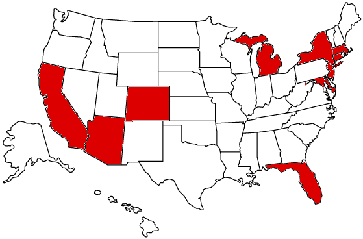The Federal Communications Commission is making new moves to demonstrate the seriousness with which it takes the “problem” of unlicensed broadcasting. This is being reflected in several ways, including the deployment of more tools in field enforcement, legislative activity, and staff changes.
First, enforcement: on Monday, March 26 the agency, in conjunction with Federal Marshals and the Boston Police Department, conducted two station-raids and equipment seizures. Both stations were effectively co-located on the same block of Blue Hill Avenue in the Dorchester neighborhood, which is populated by two-story structures with businesses on the ground floor and apartments above, as well as an old theater which now houses a Baptist church.
In reality, this was an easy two-fer for the FCC: minimum effort expended for maximum impact. The court complaints make for interesting reading. (All publicly available documents involving previous enforcement actions against these stations can be found in our Enforcement Action Database.) Continue reading “Raids, Bills, Staff Moves: FCC Enforcement Changes Afoot?”
Tag: nysba
Big-Fish Radio Capital Shaky in 2017
The second fiscal quarter’s come and gone, so it’s worth reviewing how the first half of the year’s played out for radio’s big-fish investment-games:
Clear Channel iHeartMedia: The #1 radio conglomerate in the country just extended its long-term debt refinancing offer to reluctant bondholders for the twelfth time. While going through those motions a key coalition of creditors — who hold more than 10% of iHeart’s $20+ billion debt – have been mulling over the implications of tipping the company into Chapter 11 bankruptcy.
Apparently, they’ve devised a plan by which if they’re given 49% of the company’s equity and more favorable debt-repayment terms, they’ll keep the debt-refinance shuffle going. After missing a full payment in 2016 the company ponied up on schedule this summer toward debt due in 2021. More than $8 billion comes due in 2019. Continue reading “Big-Fish Radio Capital Shaky in 2017”
Future Enforcement: Questions of Money and Will
The House Subcommittee on Communications and Technology had members of the FCC in for three hours of grilling a couple of weeks ago under the rubric of “continued oversight,” which is a fancy way of saying “giving members a chance to grandstand on pet issues.”
Subjects like the FCC’s plans to repurpose DTV spectrum for wireless broadband, reform communications subsidy programs, and the protection of net neutrality got the most attention, but questions of the FCC’s enforcement capabilities and how pirate radio fits into the mix did arise. Continue reading “Future Enforcement: Questions of Money and Will”
Prepping for a Pirate Crackdown
Even though the FCC’s Enforcement Bureau is in the throes of a major downsizing – newly-released documents indicate the Bureau will cut 44 jobs, or more than 40% of its workforce – it’s also committed itself to do something about the proliferation of unlicensed broadcasting. That said, a before-and-after summary of personnel cuts doesn’t really show a lot of refocused muscle on the ground: for example, New York’s field office will see a net increase of one agent (from 4 to 5), while the “tiger teams” being created to backstop the field offices consist of no more than three or four.
Since pirate radio’s become a plaything of FCC Commissioner Mike O’Rielly, and the broadcast lobby is chomping at the bit for a war on pirates, I would not be surprised if the agency, working in concert with groups like the NAB and New York State Broadcasters Association, attempt to sweep at least NYC this year in some “show of force.” Whatever the rhetoric may be, paper-tiger mode remains in full effect — and there’s a lot unlicensed broadcasters can do to prepare for whatever may come, both tactically and strategically. Continue reading “Prepping for a Pirate Crackdown”
O'Rielly Encourages War on Pirates
When FCC Commisioner Mike O’Rielly spoke last week to the summer conference of the New York State Broadcasters Assocaiation, he made pirate radio the lead-off topic, sending a clear signal that the Commission is responding to recent Congressional pressure and industry lobbying on the issue. How that response will manifest itself is yet to be determined, but any viable effort will have to involve thinking outside the box about how to be better spectrum-cops.
“Far from being cute, insignificant, or even somehow useful in the broadcasting ecosystem,” said O’Rielly, “pirate radio represents a criminal attack on the integrity of our airwaves, at a time when spectrum has become more scarce and precious than ever before.” He compared unlicensed broadcasters to “poison ivy in a neglected garden” and estimated that nearly one-quarter of all pirates in the country reside in the New York area (data, please!). Continue reading “O'Rielly Encourages War on Pirates”
In Face of Downsizing, Are FCC Agents Pulling Back?
Can’t say for sure, but the latest update to the Enforcement Action Database seems to suggest it, as the agency considers drastically cutting their already meager ranks. As of the end of April, there’ve been just 35 enforcement actions against 17 stations in four states. There has been no official report of field activity in May. In 2014, there were 52 enforcement actions in the same time-frame.
 2014 saw the lowest level of FCC enforcement activity against unlicensed broadcasters in nearly a decade. Where agents are active, New York continues to lead the way, followed by New Jersey and California. A station in Colorado also got a warning letter this year, but that was a follow-up to a visit last year. Continue reading “In Face of Downsizing, Are FCC Agents Pulling Back?”
2014 saw the lowest level of FCC enforcement activity against unlicensed broadcasters in nearly a decade. Where agents are active, New York continues to lead the way, followed by New Jersey and California. A station in Colorado also got a warning letter this year, but that was a follow-up to a visit last year. Continue reading “In Face of Downsizing, Are FCC Agents Pulling Back?”